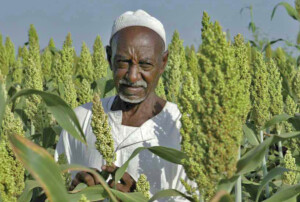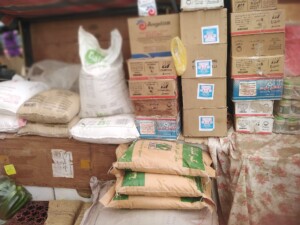Sudan taxes to be amended further in 2023 amidst waves of protests
On Sunday, the Council of Ministers approved the proposal of the Ministry of Finance and Economic Planning to amend the income tax on businesses and real estate profits and the personal income tax for the year 2023 amidst complaints and strikes against the government’s tax policies.
 Traders and merchants' march during a strike against the tenfold tax increase in El Gedaref earlier this month (social media)
Traders and merchants' march during a strike against the tenfold tax increase in El Gedaref earlier this month (social media)
On Sunday, the Council of Ministers approved the proposal of the Ministry of Finance and Economic Planning to amend the income tax on businesses and real estate profits and the personal income tax for the year 2023 amidst complaints and strikes against the government’s tax policies.
The meeting also approved the general features and guidelines for the fiscal year 2023 budget presented by Abdallah Ibrahim, the undersecretary of the Ministry of Finance.
According to the Sudan News Agency, the meeting stressed the importance of the Ministry of Finance’s mandate over public money and its efforts to improve the revenues for and in the states.
The ministry also aims to unify the laws on terms of service and eliminating discrepancies in wages.
Business profits tax
The decision came after the Chambers of Commerce Federation (CCF) demanded an immediate review of the current economic policies and the abolition of the business profits taxes, which were recently increased significantly.
At a meeting of businessmen in Khartoum on Saturday, CCF head Nadir El Hilali said that the economic policies and increased taxes on business profits have worsened the already severely lacking purchasing power, which in turn reduced the gross domestic product and state revenues.
'The economic policies and increased taxes on business profits have worsened the already severely lacking purchasing power' – Nadir El Hilali
Minister of Finance Jibril Ibrahim, who addressed Saturday’s meeting as well, said that he does not have the authority to reduce business profits taxes from 30 percent to 15 percent without the approval of the Council of Ministers.
"If the problem is in the method of tax assessment, it must be addressed and reviewed,” he said.
He further referred to the abolition of the production tax on a large number of industrial products after complaints from the industrial sectors.
Tax strikes
On Sunday, the merchants of Shendi Grand Market in River Nile state went on a two-day general strike because of the exorbitant taxes recently announced by the federal Ministry of Finance. Sudan has recently witnessed protests against exorbitant tax increases, especially by traders who are facing a tenfold increase in their business taxes.
Jibril Ibrahim called for expanding the ‘taxes umbrella’ [span of taxes] at the time and considered it “the most effective and successful way to increase tax revenues and combat tax evasion”.
The Sudanese government is not receiving any external support for its annual budget for the second year in a row, so it must rely on its own resources to complete the 2023 budget.
However, many economic experts in the region are not convinced that increasing taxes is a good way to support Sudan’s economy. They warn that it will further increase the economic hardships of many Sudanese.
Tax increases will eventually impact the consumer and will lead to a weakening of purchasing power and reluctance to consume, economic analyst Hafiz Ismail told Radio Dabanga.
The Famine Early Warning System Network (FEWS NET) the government’s raised taxes on agricultural products, port fees, industry, and trade formed a further constraint on Sudan’s household purchasing power.
After his visit to Washington, the Minister of Finance repudiated any further tax increases but also confirmed that the ministry had implemented an agreement between the Employers Union and the Council of Ministers dating from 2019 to raise the tax on business profits in the industrial sector by 10-15 per cent and in the services sector by 20-30 per cent.
Jibril Ibrahim in Washington
Jibril Ibrahim recently visited Washington to partake in the World Bank – IMF Annual Meeting and said that the Sudanese delegation was able “to circumvent the decision to suspend aid and obtain promises” from various sides.
The October 25 military coup last year moved international donors to suspend financial aid, which saw Sudan lose $4.4 bn in support and contributed to the country's current funding crisis and economic despair.
The Minister of Finance stated that the visit achieved great gains, including the resumption of communication with the World Bank and the IMF, and confirmed that Sudan is allowed to benefit from World Bank support for food, climate change mitigation, and emergencies.
He also acknowledged “the impact of the 2021 coup d’état on cooperation with international institutions” and said that “it is not easy to lift the freeze”.
World Bank and IMF
Kamal Karrar, member of the Economic Committee of the Sudanese Party of Sudan, told Radio Dabanga on Sunday that “the Sudanese economy is heading toward the abyss” due to the dependence on the World Bank and the International Monetary Fund before and after the revolution.
According to the economist, “the path of dependency on the World Bank and the International Monetary Fund is closed and leads to the impoverishment of more people”.
'The path of dependency on the World Bank and the International Monetary Fund is closed and leads to the impoverishment of more people' – Kamal Karrar
Economic expert Mohamed El Nayer also called for a review of the implementation of the programme and policy of the World Bank and the IMF given that Sudan did not receive any compensation despite the implementation of the programme by 90 per cent.
Commenting on the visit of the Minister of Finance to the International Monetary Fund and the World Bank more than a week ago, El Nayer told Radio Dabanga that the international community has taken the October 25, 2021, coup as “an excuse not to fulfil its promises towards Sudan”.
Sudan should not rely too much on the international community, he said, but rely on its own resources. He explained that Sudan could do more to “exploit its huge resources such as agriculture, gold, and others, and employ them for the benefit of Sudan instead of exhausting the citizen's pocket with levies, fees, customs, and other taxes”.
He explained that the World Bank did not provide the transitional government of former PM Abdallah Hamdok government with any aid during its two years in power, despite Hamdok being a civilian leader that steered the country towards democratic transition before his government was toppled in a military coup.











 and then
and then